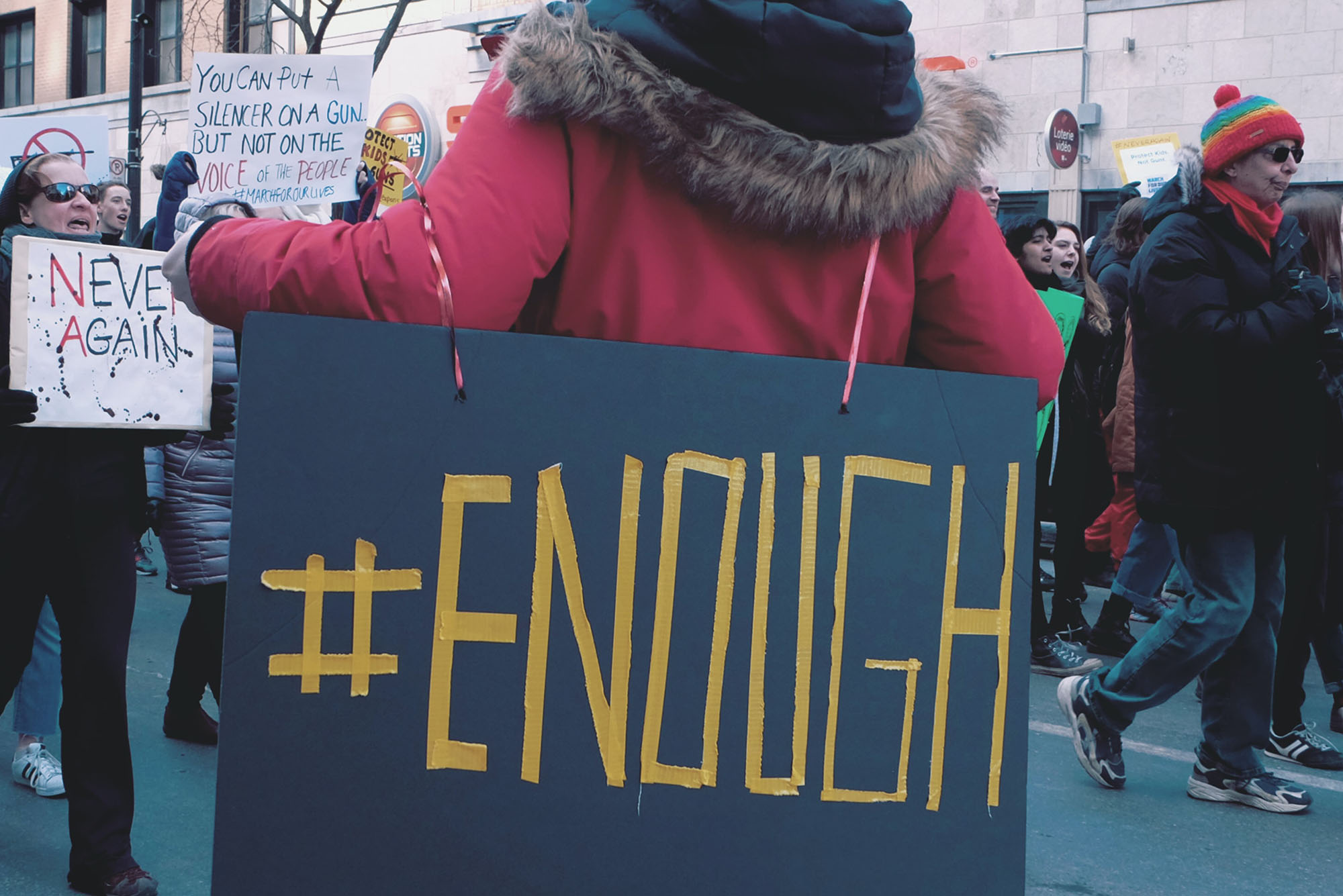BU Opts against Forswearing Investments in Gun Manufacturers

BU Trustees’ Executive Committee has decided not to put investments in gun makers off the table, as gun violence prompts protests like this 2018 Montreal rally. Photo by Rux Centea
BU Trustees Reject Request to Avoid Future Investments in Gun Manufacturers
Declining a petition, Executive Committee cites the board’s criteria for divestment
The Executive Committee of BU’s Board of Trustees has rejected a recommendation from the Advisory Committee on Socially Responsible Investing to avoid investing any University endowment funds in civilian gun manufacturers. The committee cited its belief that gunmakers’ social harm doesn’t rise to the divestment standard of the board.
BU’s endowment portfolio currently holds no investments in gun manufacturers. But the committee’s decision leaves the door open for future investments.
The issue surfaced last year in a petition created by Shana Weitzen (Pardee’25) that garnered more than 1,000 signatures, supporting avoidance of investments in civilian gun manufacturers.
Universities, which typically do not disclose what industries their endowment funds are invested in, have come under increasing pressure to divest, or avoid investing, in industries related to various social justice causes. This has presented challenging decisions for boards of trustees about balancing widely debated social concerns with fiduciary obligations to their institutions.
BU, with an endowment of approximately $3 billion, announced in 2021 that it would divest from the roughly $200 billion U.S. fossil fuel industry, due to those fuels accelerating climate change. (In contrast, the US civilian gun manufacturing industry, with only two publicly traded companies, is valued at roughly $20 billion)
Weitzen originally sent her petition to the board’s Advisory Committee on Socially Responsible Investing (ACSRI). The ACSRI, after a thorough discussion around the pros and cons of the issue, voted to recommend divestment and non-investment in civilian gun manufacturers to Board Chairman Ahmass L. Fakahany (Questrom’79). He asked the Executive Committee to consider the request at its February 14 meeting.
“I can report that there was thoughtful discussion of the issue and an appreciation for the harm caused by gun violence—but also, not a consensus that this issue met the criteria adopted by the Trustees for placing limitations on endowment investing.”
“The Executive Committee determined that the proposal should not be adopted,” says Trustee Richard Reidy (Questrom’82), chairman of the ACSRI. “I am sure that this outcome is disappointing to [some], but I can report that there was thoughtful discussion of the issue and an appreciation for the harm caused by gun violence—but also, not a consensus that this issue met the criteria adopted by the Trustees for placing limitations on endowment investing.”
Those criteria include that the reduction of social harm outweigh “the risk of censorship of competing views within the University or the risk that the wisdom of the decision will fail to withstand the test of time.” The criteria were adopted after the Executive Committee opted against a previous ACSRI recommendation that BU divest from gunmakers. That recommendation followed the 2012 Sandy Hook Elementary School shooting.
“I’m just very angry,” Weitzen says. “There was just the shooting at Michigan State University only two weeks [ago]. It’s just really frustrating that these shootings keep happening, and the University continues to not understand that there’s this very large degree of social harm that firearms cause. I do take solace in [the absence of current gun investments]; I think that is a good thing, of course. But the market’s always fluctuating, things are always changing. The gun lobby and the [National Rifle Association] have a lot of power.”
A Republican bill to make the AR-15 the “national gun” could boost gun makers’ stocks, “which would maybe cause a place that has an endowment … to look into those kinds of stocks,” she adds. “So it just concerns me that this is more of an appeasement than a step in the right direction.
Comments & Discussion
Boston University moderates comments to facilitate an informed, substantive, civil conversation. Abusive, profane, self-promotional, misleading, incoherent or off-topic comments will be rejected. Moderators are staffed during regular business hours (EST) and can only accept comments written in English. Statistics or facts must include a citation or a link to the citation.